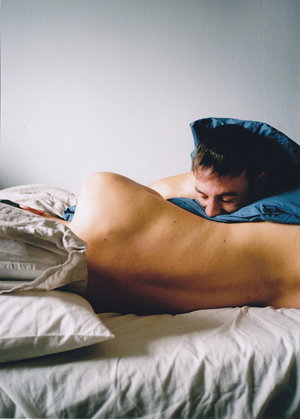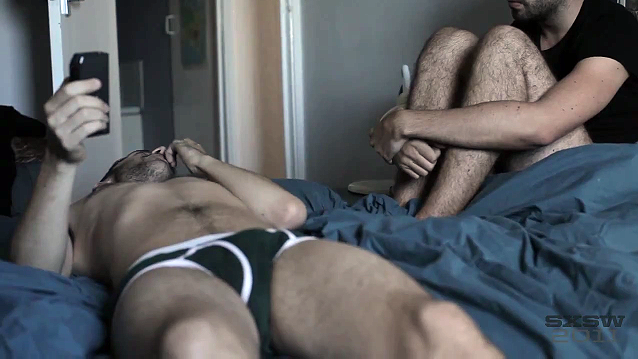(NUMEROUS UPDATES and FOLLOWUP) If, as I keep saying, pace Edmund White, the function of gay literature is to induce the reader to nod and mutter “yes,” then the lesson I have learned from a quarter-century’s experience is that gay cinema is the Cinema of Recognition. If you can’t recognize yourself, the picture doesn’t work. Conversely, the only way a picture can work is if its portrayals are recognizable. Gay cinema is more steeped in archetypes than black comedies the fonts on whose posters tell you they suck.
(You see now why straight guys don’t want to watch gay movies, and why we are sick to fucking death of boy/girl love stories. Who gives a shit? Why, as Nick Spangler puts it, are you so egotistical every story has to be about you?)
I believe this is, at root, the objection that to this day burns inside Scott Thompson about Philadelphia. And it is why the Britanski Queer as Folk works while the Amerikanski version, so ersatz it was filmed here, is dishonest enough to border on libel. Nobody seemed gay on Breakfast with Scot. New Queer Cinema titles and low-budget one-offs on the TLA and Strand labels fail on this score. In fact, the list of failures is lengthy.
I have here a pile of recognition movies: Urbania, Querelle (despite everything), The Boys in the Band, the ur-text Parting Glances and its intertextual metasequel Billy’s. (Chuck & Buck. Head On. Edge of Seventeen. One role in Trick.)
We enjoyed another one recently, which I’d heard of but actually watched only because it was right there for free at the miraculous Toronto Public Library: Patrik, Age 1½, a straightforward teal-and-orange story, with good type and Arial subtitles, in which everyone seems real. (We went on to argue about Sven, the former hetero, and Göran, the gentle, motherly gay doctor for whom stability is everything. The scene we argued about lasted less than 20 seconds and there was shedding of tears.)
You could write your own fan fiction based on this movie. Imagine the hijinx Sven and Patrik get up to during that trip to Berlin to see Rammstein.
Meanwhile, in another part of the forest, I made myself load a post from an atrocious gay blog, then actually enabled a YouTube video inside it. This sequence of events barely ever happens, so the fact that it ended up presenting me with the trailer to Weekend surely must be providential.
 Director Andrew Haigh, his production designer, and his near-guerrilla actors put the cart before the horse a bit by opening the trailer with a lad crotch-first in those dark undershorts with thick white piping that all the kool kidz are wearing. (At least it separates the men from the boys.)
Director Andrew Haigh, his production designer, and his near-guerrilla actors put the cart before the horse a bit by opening the trailer with a lad crotch-first in those dark undershorts with thick white piping that all the kool kidz are wearing. (At least it separates the men from the boys.)
They shot this thing on a Canon still camera, in story order, on a budget of approximately nothing. They hired those chroniclers of scrawny gym refuseniks, Quinnford and Scout, to shoot stills (recognizable sample). It’s reminiscent of that Butt-sanctioned scrawny-gay-hipster-porn project but more wholesome.
I don’t see how a “film” shot on a DSLR actually works when projected in a cinema. (That means I really don’t want to have to pay 15 bucks to queue up to watch it, after enduring horrific lesbian short films as lead-ins, at the Inside Out festival, if that is its fate.) A very large flatscreen and an audience of 30 would make more sense, but what makes the most sense is watching it on some kind of computerized device. I’ve already mailed Haigh about how to scare up funds for captioning and description.
It’s like I’m writing the fan fiction for this movie before I even see it. Why am I doing that? It’s recognizable. (2011.03.24)

Letting oneself down
Two months after writing the foregoing, Weekend played at Inside Out. (To a full house, grossing Inside Out well over $11,000, about 7% of the film’s budget.)
It was fine, I guess.
I had built up this movie so much in my mind’s eye that I was not expecting a sodomitical Trainspotting, with full-on drug addicts. During post-screening Q&A, Andrew Haigh denied they were, but they are. (Do you do drugs before heading out to a party that later serves drugs?)
I should not have been surprised by the block of council flats whose crushingly Soviet, flat concrete exterior and dangerous walkways were so often depicted. England is a living dystopia; drugs are what its gay men need just to survive. (Compare Man’s World by Rupert Smith.)
I hated the character who was more like me but felt a soft spot for the other one, though I could never keep their names straight. Now I know for sure what I feel about the scrawny Quinnford & Scout æsthetic. (Those two have a walk-on, actually.)
I believe neither Glen nor Andrew Haigh realizes that his going-away scene has him, in essence, leave in the morning with everything you own in a little black case.
The bafflement on Russell’s face (I had to double-check his name just now) as he sits among shrieking heterosexualists at his goddaughter’s birthday rang true. But Haigh commendably veered away from the expected when Russell’s best mate Jamie, that girl’s dad, insisted on driving Russell to the train station. Jamie knew what awaited Russell there was important even if he did not. Jamie has always tried to understand Russell, who in certain respects is his own worst enemy.
I was thrilled at every sidelong glance we were afforded of Nottingham’s nice modern trams. Even while it was happening, I knew that was a bad sign.
Typography is in Gill Sans and should have been brilliantly, vibrantly colourful, not flat white against the crushing bleakness of the Nottingham “cityscape.” The neutral double quotes in the closing credits were a classy touch.
After the show, we ambled down to the front row for Q&A. Haigh denied there was very much looping or re-recording of dialogue, which is another way of saying the audio is simply out of sync a lot of the time. (To my surprise, by the way, the movie looked great on a giant screen despite having been shot on a DSLR.) There were various other questions and answers.
I kept wondering why I gave a shit about helping Haigh and producer Tristan Goligher secure a grant (in an amount roughly 15% of the film’s whole budget) to get this fucker captioned and described, and why I was and am concerned that it will be subjected to some kind of CaptionMax-style hack job once it hits television and disc. I had sent both of them what I hoped were helpful and encouraging E-mails on that topic. Shouldn’t at least a producer answer E-mail that offers leads on film financing? Haigh had no reason to know who I was, but I felt especially ignored sitting 15 feet away from him.
Why did I care so much about a movie I hadn’t seen yet, and why did I care that it be treated properly in accessible versions?
Why do I feel like such a chump after shelling out 44 bucks to gain admittance to the long-awaited Toronto première of Weekend?
Why did I have to let myself down like this?
Toronto reasserted its debased standards when the twit interviewing Haigh onstage, Jason St-Laurent, quoted “a blogger” who called Weekend the kind of movie straight guys would like. So the joke won’t just be on me, then.
What does Andrew Haigh have to say?
Two months after I first tried to contact him and four hours after publishing the update above, Haigh sent along a reply, which I can excerpt here: “Sorry you felt you wasted all that money on the ticket. You should maybe lower your expectations in life.” To match his tact? (See update.)